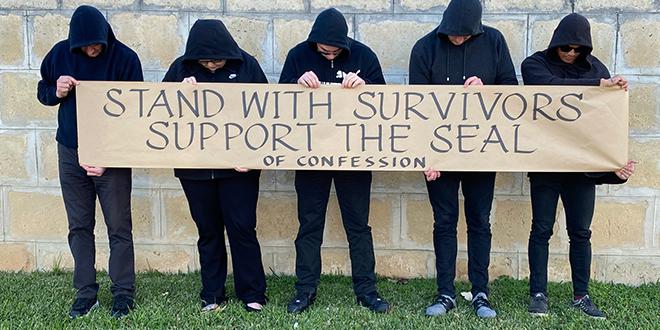|
Seal of confessional vital for some survivors of sexual abuse
By Mark Bowling
A GROUP of survivors of sexual abuse have defended the Seal of Confession as a vital lifeline and aided their recovery. Their testimonies paints the confession box as a safe place to speak and ease their trauma, and contradicts the intent of new laws across Australia aimed at compelling priests to report child sexual abuse offences disclosed during confessions. South Australia, Victoria, Tasmania and the Australian Capital Territory have already enacted laws that make it a criminal offence for a priest to withhold abuse disclosures. Western Australia and Queensland are moving towards similar laws. New South Wales has deferred any action. A spokesman for a survivor group in Western Australia said few people realised that victims and survivors – Catholic and non-Catholic – often visited the confessional precisely because of the Seal of Confession. “The Seal offers victims a safe, secure and watertight place where they can be listened to without cost, where they can remain anonymous, and can decide what they’re ready, and not ready, to share – and all of this in complete confidence,” spokesman James Parker said. “The Confessional Seal as it presently stands literally saves lives and offers every abuse victim the chance to begin to heal.” Mr Parker and a group of anonymous survivors are campaigning in WA against a bill that has already passed the state’s Lower House of Parliament and would require mandatory reporting of abuse heard in the confession box. In Queensland, similar legislation is listed before parliament for debate. “The government’s bill threatens this safe space; it destroys hope and will lead to more suicides,” Mr Parker said. “No decent citizen or politician should stay quiet and let this happen.” To boost their campaign, the survivor group has produced a series of short videos “Support Survivors and Save The Seal”, for airing in churches across WA this weekend. Five survivors anonymously share their stories of child sexual abuse and how the seal of confession helped to stop them suiciding whilst also kick-starting their journeys of recovery. The survivors are female and male, Catholic and non-Catholic, indigenous and non-indigenous, aged 18, 27, 35, 52 and 75. “One of the safest people and places I knew I could turn to was my local priest under the Seal of the Confessional,” the 18-year-old male survivor said in the video. “If I’d thought the priest would ever tell anyone what I shared with him, then I’d never have gone to him in the first place. Politicians just don’t get this. “The government should back off from trying to police the confessional. This is my safe place to talk about my abuse. “I know it’s the same for many other people too. It feels as though politicians are now attacking me personally when I am the one who was wronged and hurt as a kid. And they don’t seem to want to understand survivors’ pain.” A 27-year-old male survivor said it was only when he went to confession and spoke about his abuse that he tasted “true freedom for the first time”. “The (WA) State Government’s proposed amendments feel to me like a calculated external attack on the Catholic Church which is both my soul’s home and its hospital,” he said. A 75-year-old survivor said: “I was abused as a six-year-old. I was an innocent. It has affected my whole life. It took me almost 60 years to speak to anyone about this”. “And where did that happen? In the confessional. “On that day healing began. It took me another five years to tell a counsellor. “Without the Seal of Confession I would still be walking around in pain – living without ever having told someone.” Laws for mandatory reporting were recommended by the Royal Commission into child sexual abuse. In particular, the commission’s final report states that: “State and territory governments should amend laws concerning mandatory reporting to child protection authorities to achieve national consistency in reporter groups.” This includes out-of-home care workers, youth justice workers, early childhood workers, registered psychologists and school counsellors, and people in religious ministry. Mr Parker said the royal commission undertook import work, but the final report did not provide a “full picture of child sexual abuse in Australia”. “Its remit addressed a mere fraction of historical abuse, when it is known that the vast majority of child abuse occurs beyond the boundaries of institutions and looks different today than it did decades ago,” he said. “For state governments to now use this final report as a template for best practice of child protection is at best delusional and at worst diabolical. “Governments fail to consult all victim groups and yet force through legislation to police their pain-filled stories. “Survivors in WA are speaking up about the irreplaceable role the priest and the seal of confession play in helping their broken lives to heal and find hope.” In a submission to the Queensland parliament early this year, Brisbane Archbishop Mark Coleridge said stripping Catholics of the Seal of Confession made priests “less a servant of God than an agent of the state”. Archbishop Coleridge said the proposed legislation raised “major questions about religious freedom” and was based on a “poor knowledge of how the sacrament actually works in practice”. He said protecting a child or vulnerable adult’s right to safety and the right to religious freedom were not at odds. The seal enabled Catholics to come freely before God, with the priest simply acting in Persona Christi (“in the person of Christ”), to confess their sins. Archbishop Coleridge said the seal “enables the penitent to speak openly before God, to stand open and honest before God, to hide nothing from the God who sees all and forgives all.”
|
.
Any original material on these pages is copyright © BishopAccountability.org 2004. Reproduce freely with attribution.
